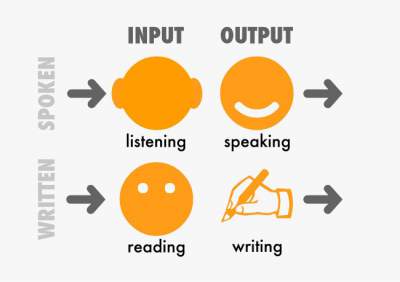It's been a long time since my last article. Truly, I feel good to be back. That said, I'd like to bring something special for those who wish to improve their pronunciation and accent. I'm not a big fan of copying accents but, for the sake of this lesson I'm going to put it there for you with this ideology; accent is not that important, as long as you're clearly pronouncing grammatically correct sentences. The targeted audience of this lesson is CEF (Common European Framework) Intermediate to Upper Intermediate levels. The members who are below those levels might find it little bit difficult to follow, but I strongly advise you not to give up. Without further ado, let's start the lesson.
Whenever you are watching an English movie, you might be wondering; what if I can talk like them? It would be very nice, right? Well, I used to think like that. And I followed the following steps to the letter and came up with amazing results which sometimes even made me wonder, is this really me!
People start learning by listening to things; it's a very important ingredient which helps to speak properly. That's why we give a higher priority to practice conversational English in our classes. Because we know the fact that good listeners will become good speakers and good readers will become good writers. Therefore, we had been trained to balance these aspects in our lesson plans. Frankly, that's why we encourage our students to listen and read as much as they can. A higher level of specialty or fluency in Spoken English will never come solely on the knowledge of grammar; it requires the touch of the native accent. That doesn't mean we have to talk like them, it means, we have to carefully examine the way they pronounce, where they stress, intonation, connected speech, collocations and last but not least the colloquial language. You might feel tired or lost, but, this is it, this is the real deal. All the people who have mastered the language have trained their ears over a considerable period of time. The following approach will definitely help you to acquire a better level according to the way you put it into practice.
Step 1: Find an audio (if you can find a video with audio, it's much better) of a Native Speaker with its transcript (complete text, not the subtitles). Length of the file should be 2 to 5 minutes. If the file is too long, don't worry about it. Just, take the first 2 to 5 minutes. :)
This step is very important; this is where we're going to select the suitable lesson material. It changes according to your abilities. You must find materials (text + audio) which you can understand, the pace (speed) of the speech is important; it mustn't be at a pace that's either too fast or too slow, try to find a material with an average pace which you can easily mimic (imitate). Finding a material which is interesting to you is a great advantage. You will be listening to the same material numerous times. Keep in mind that, unless you have something interesting, you might get bored.
I'm preparing my lessons with the help of BBC Learning English materials; you can also find a material of your choice there. Me and my students are so grateful for the service that the BBC is offering free of charge. Hope you will feel the same way about their service by the end of this lesson as well.
http://www.bbc.co.uk/learningenglish/english/features/6-minute-english
You can download the selected material's PDF transcript and the audio file at the top right of the page.
Step 2: Listen to understand without the transcript. Listen as many times as necessary. Get familiar with the vocabulary (new words). Set the volume level to 80%. Do this at least for 3 rounds.
Step 3: Listen to how they speak. Focus on the intonation and stress. See how they deal with syllables and the connected speech (way they are joining words). At the beginning you might not hear them clearly but, when you listen to it for a couple of times, you will be able to hear the details. If you have a sound knowledge of intonation, stress, syllables and connected speech, you will be enjoying this. As I said before the targeted audience is CEF Intermediate to Upper Intermediate Levels. Those who in or above those levels, can easily understand what I'm saying. And those who are not, do please just try to follow the way you can because, there's a means to an end. Do this at least for 5 rounds.
Step 4: Listen and mouth the text. In this stage, you are moving your mouth as you are speaking like them without the sound, not even whispering. You can speak along with the speaker without your voice. Just listen to them and read the transcript along with their speech without making any sound. Do this at least for 2 rounds.
Step 5: Listen and whisper. Now, you listen + read + whisper simultaneously (at the same time). Do this at least for 2 rounds.
Step 6: Listen and read. You might not be able to speak like them; perhaps you have a different voice compared to them. Don't worry about it, just focus on the pronunciation and connected speech.
Decrease the volume to 60% and speak up a little (voice must be audible than whispering). Do this for a round.
Decrease the volume to 40% and speak up a little (voice must be audible than earlier). Do this for a round.
Decrease the volume to 20% and speak up a little (voice must be audible than earlier). Do this for a round.
Step 7: Read without audio (volume 0%) and record yourself. By now, you must have a clear understanding on how to pronounce, where to stress, how to use different intonations and linking of words, where the sounds are disappearing, where the sounds are joining and changing. If not, don't worry about it, just record yourself. You can use your mobile phone's audio recorder. Do this for a round.
Step 8: Compare the original audio file and your recording and repeat 4 to 8 steps till you are satisfied with your recording. When you feel like it's good enough, put the material and your final recording in the same folder and look for your next material on BBC Learning English. When you have 10 or 20 recordings as such, you will definitely notice the way you talk is much better than the way you talked before. It will take some time and don't try too hard, try to enjoy it.
That's it! This requires a sheer will to improve one's Spoken English. I've been using this method for years and have seen students improving themselves. We can always adapt, keep no doubt about it, and the success will be determined by the sustained effort. Thank you and have a wonderful time.













 Amazon link to Oxford Collocations Dictionary
Amazon link to Oxford Collocations Dictionary





